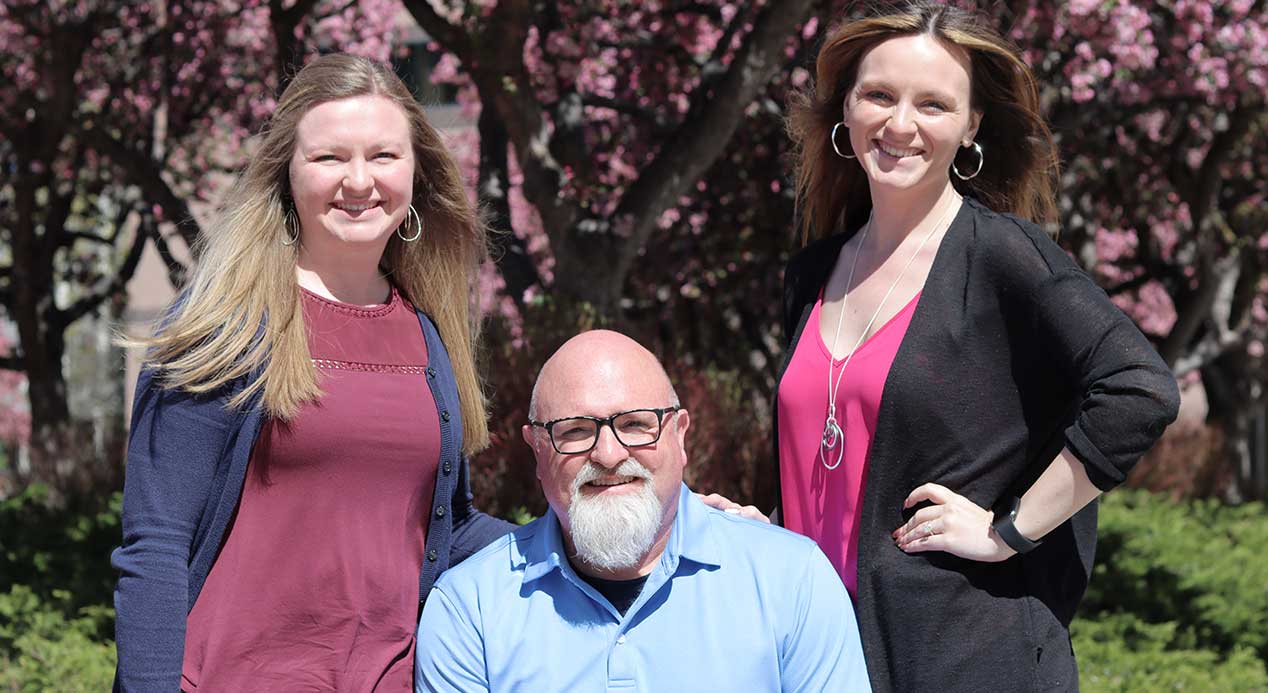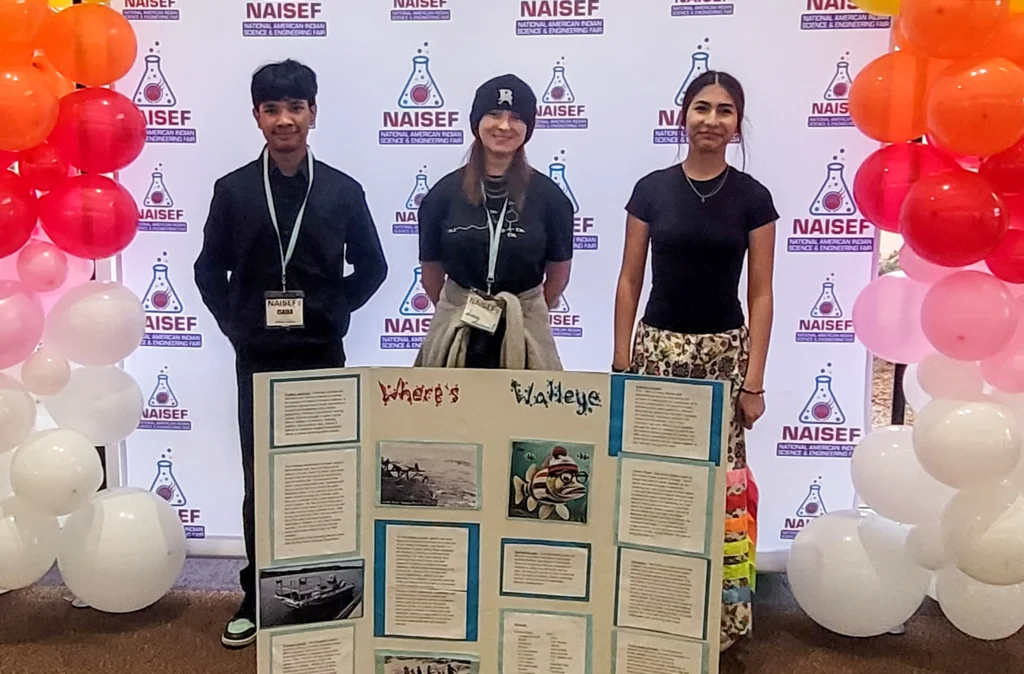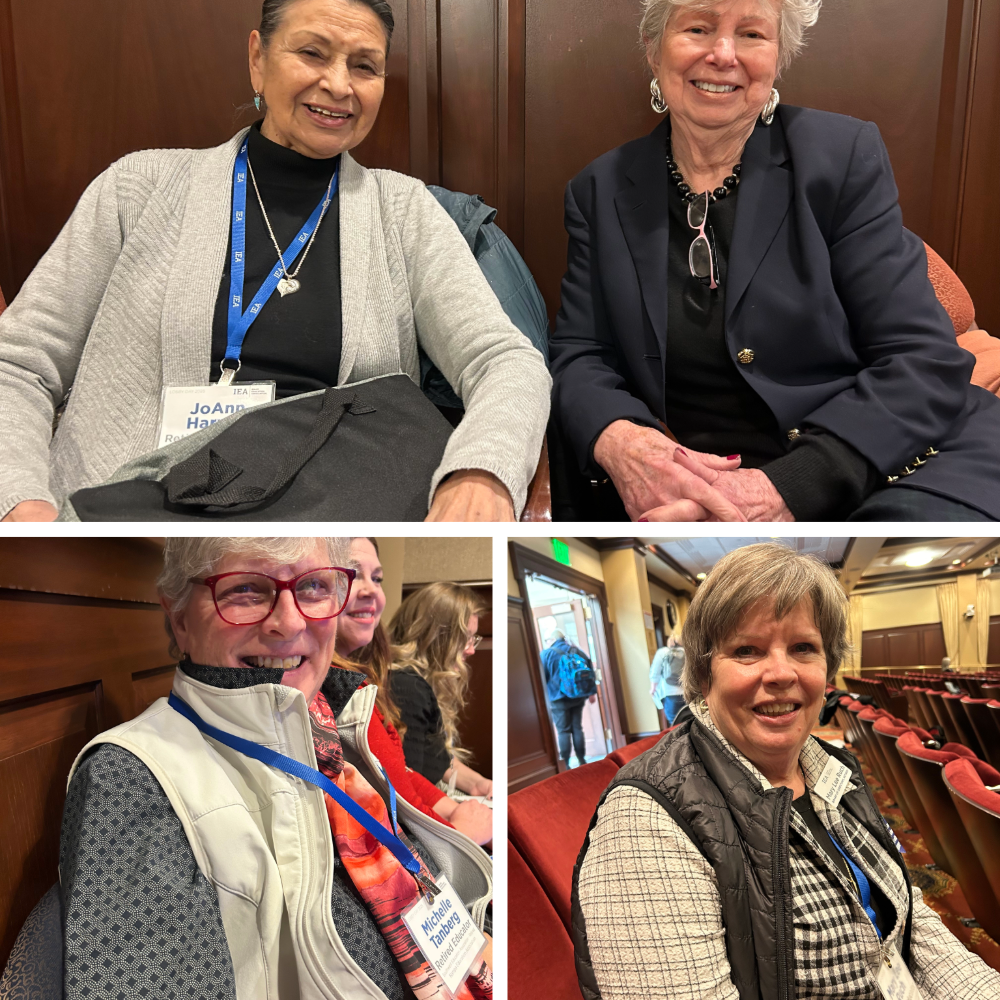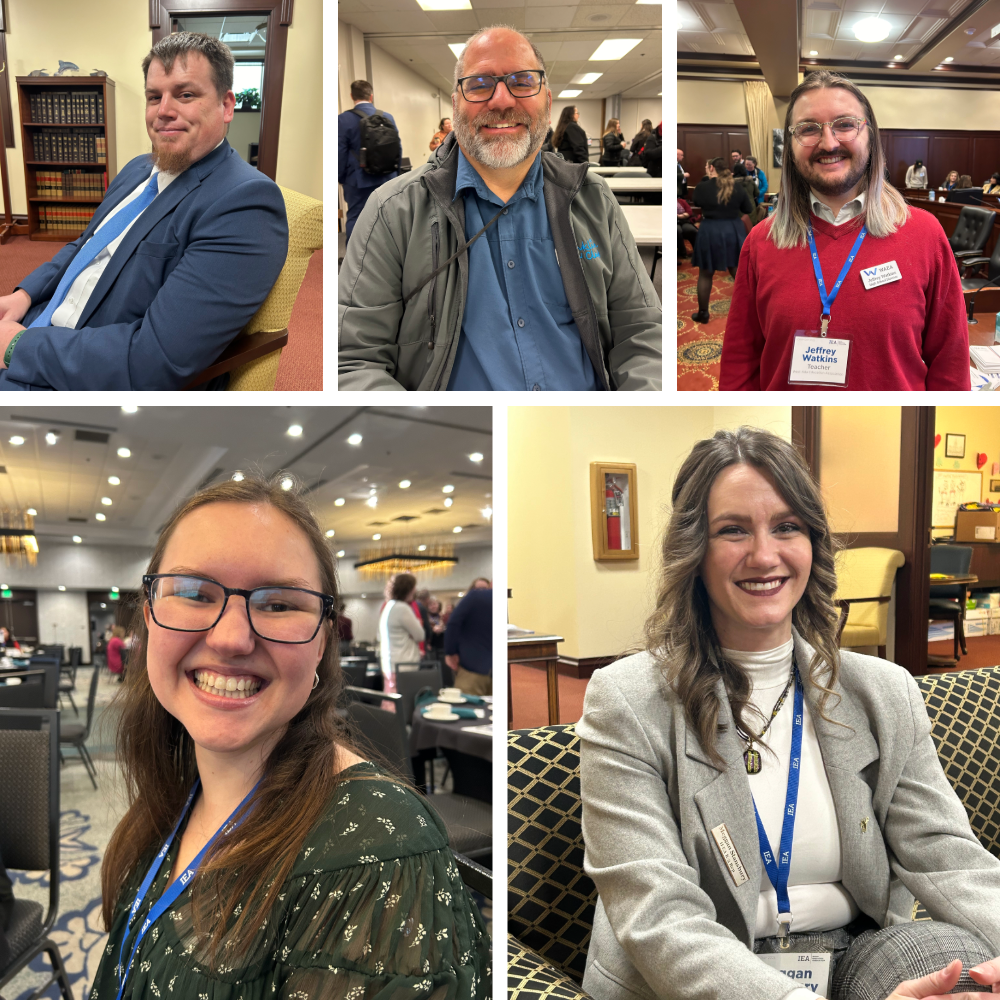For Dave Gibson (center) and his two daughters Hope Wayne (left) and Brianna Stackle (right), being IEA members is just what they do in their family.
Hope Wayne and Brianna Stackle really didn’t choose to join the Idaho Education Association when they became educators. It’s just what you do in their family.
The sisters grew up watching their father, Dave Gibson, fight to improve the lot of his students and educator colleagues as a leader in the Twin Falls Education Association (TFEA). Family discussions around the dinner table often centered on how Idaho politics often undermines public education and educators. He often traveled to National Education Association and IEA meetings or to Boise to lobby lawmakers at the Statehouse.
And when the sisters decided to become educators themselves, they organically knew that being a member of the union was part of that decision.
DEFEND WHAT YOU BELIEVE IN
“He didn’t even have to tell me I was going to be a member,” said Hope, who teaches social science and history to seventh- and eighth-graders at O’Leary Middle School in Twin Falls. “I was asking ‘how do I do this?’ because he’d modeled that for us. He showed us that you must defend your profession and defend what you believe in and stand up for your students.”
Bri, who just accepted a new role to teach eighth-grade English at Boise’s South Junior High, agrees that there was no question about joining the union, once she made the decision to be a teacher instead of a doctor or a nurse. But both sisters remember what Dave said about becoming a teacher.
“We had a very serious ‘are you sure?’ discussion,” Bri said about the moment she told her dad she wanted to go into the family business. Teaching is immensely rewarding, he told his daughters, but not for the faint of heart. Defiant students, angry parents, bad administrators, too much work for too little pay, extreme politics — they are not universal, but every educator must deal with them in their job at some point, he said.
“He said, ‘go in with your eyes wide open and know what you’re getting into,’” Bri remembered.
31 YEARS OF EXPERIENCE
Dave was speaking from experience — 31 years of it.
Hope, now an 8-year veteran of the classroom, was just a baby when Dave started teaching music in the Magic Valley. His first contact as a teacher paid $18,000 (with stipends) and was a pay cut from what he made waiting tables. He was in the union, but as the sole provider for his young family, he remembers those first few years as financially difficult.
He briefly left public education for a stint selling musical instruments to schools and teaching at the College of Southern Idaho. When he returned to the classroom, he decided he couldn’t afford the union dues. But he quickly learned he couldn’t afford to not be a member.
“When I came back, I didn’t become a member right away,” said Dave, who is the band and choir director at O’Leary Middle School in Twin Falls, the same school where Hope teaches. “Because I wasn’t a member, I didn’t have an advocate when I was RIF’d (reduction in force; i.e. laid off) in 2002-2003.”
Out of the classroom for a year and the only certified educator to lose his position, Dave quickly became convinced that his lack of union representation made him an easy choice for administrators when deciding who to let go. Thankfully, he had good friends in TFEA and when bargaining the next year’s contract, the union also negotiated his reinstatement. It was a potent lesson.
“That one short time I wasn’t a member cost me dearly,” he said. “It didn’t end me, but it taught me how important membership is — no matter what.”
Since then, Dave never lets his engagement with all levels of the union slip — especially his perennial role on TFEA’s bargaining team. He is a regular attendee of IEA’s annual Lobby Day, where hundreds of members from around the state descend on the Statehouse to lobby policymakers. He recently finished a term as IEA’s Region 4 president. He’s served four years as president of TFEA and he serves as a building representative at O’Leary. He’s been a delegate to IEA’s Delegate Assembly several times and represented IEA at the NEA’s Representative Assembly, the largest democratic deliberative body in the world. He’s also currently serving as interim chair of IEA’s Center for Teaching and Learning, which he helped start as a founding board member and where he often teaches his fellow IEA members.
Dave’s example of the importance of not only being a member, but also being engaged in the union’s work wasn’t lost on Hope and Bri.
THE MOST ENGAGED VERSION OF MYSELF
“I became a teacher because I want to help students,” Hope said. “If I fully believe that, then I have to be the most engaged version of myself that I can be – not only as an educator, but also as an advocate for public education. If I’m not, I’m doing my students a disservice.”
Even as a youngster, Hope was drawn to politics (she considered becoming a lawyer) and today the social studies teacher is deeply engaged in the political side of IEA’s work. She’s a member of IEA’s statewide GR/PACE (Government Relations/Political Action Committee for Education) Committee and often teams up with her dad to talk to lawmakers about IEA’s policy priorities during its annual Lobby Day.
“Everything that happens in my classroom is directly impacted by public policy — literally everything,” Hope said. “So if I’m going to give my students the best learning environment I can give them, I have to be involved in the process that affects that in addition to their direct education.”
Bri approaches her engagement with the union a little differently than her father and sister. She understands the value being involved in the politics of education, but for her it’s the relationships she builds with her colleagues through the union that energize her. That’s why her role in IEA’s Growing Engaged Members (GEMs) initiative is so appealing.
“I get to have unique conversations with members across the state,” Bri said. “We get very vulnerable about the good, the bad and the ugly of our particular situations as teachers. That helps me feel more connected, especially when certain parts of the job start getting to me.”
NOT DONE WITH THE HARD QUESTIONS
Starting her sixth year as an educator, Bri may not be totally done wrestling with the hard questions her dad asked her when she first announced her intention to follow in his professional footsteps. Her first five years, traditionally seen as the “make-or-break” years for early career educators, were spent in the Vallivue School District. Her union membership and values were an outlier among her colleagues there and the twin currents of the pandemic and extreme politics left her a bit circumspect about her career choice. In fact, she eloquently testified about her feelings last winter in front of lawmakers.
“I think teachers know that a lot of what we don’t love about our job has nothing to do with teaching,” Bri said recently. “It’s all of the other things that get added on to our job, the pressures we face, the pay, the lack of community support that make us question what we do.”
Now, with her proverbial fifth year behind her, a new, more union-friendly district as an employer and the challenge of teaching a new age group (Dave, Hope and Bri are now all teaching middle school) she’s hopeful for what lies ahead. She’s eager to use her role as an IEA GEM to grow her network of colleagues.
“It makes me excited because I think it could be like that in other districts,” Bri said of the union engagement level in Boise. “I’m looking forward to learning about it firsthand and having discussions with others around the state to say ‘here’s what we’re doing…’”
In fact, all three Gibsons (current and former) are excited about the gains public education has made in recent years and the role their union has played in that. In particular, they point to the legislative success of the 2023 session — when educators secured record funding for salary increases — as a potential watershed moment for public education in the state.
“I feel more positive about education now than I have for a long time,” Dave said. “Yeah, we have those that we are fighting against. But with our allies and the way we’ve been able to advocate for ourselves as educators, Idaho is in a really good place going forward.”




